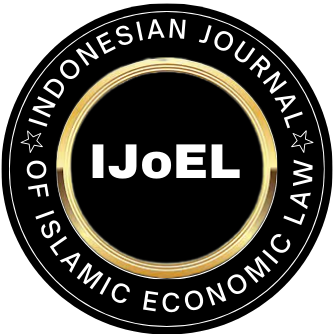Istinbath Methodology of DSN-MUI: Integrating Classical Islamic Jurisprudence with Contemporary Needs
DOI:
https://doi.org/10.23917/ijoel.v1i2.5570Keywords:
Islamic jurisprudence; , Iijtihad intiqa’i/takhyiri; , Maslaha; , MakharijAbstract
The objective of this paper is to examine the methodology employed by the National Sharia Board of the Indonesian Council of Ulama (DSN-MUI) in deriving legal rulings (istinbath) within the dynamic framework of the intersection between classical Islamic jurisprudence and contemporary societal needs. The study seeks to provide a detailed analysis of the approach adopted by the DSN-MUI, with a particular emphasis on its predominant utilization of the Intiqa’i or Takhyiri framework. This approach underscores the significance of considering maslaha (public interest) and makharij (solutions) over tarjih (preferential selection based on the strongest evidence). Employing a qualitative research methodology, the paper conducts a thorough content analysis of the fatwas issued by the DSN-MUI and relevant scholarly literature to delve into their istinbath process. The research findings suggest that the DSN-MUI occasionally resorts to collective ijtihad (ijtihad jama’i) in exceptional circumstances, diverging from the prevailing consensus on issues such as non-cash gold transactions and the conversion of tabarru’ contracts into mu`awadhat contracts. By shedding light on the application of the principles of tafriq al-halal wa-al-haram (differentiation between what is permissible and impermissible) and al-’ibrah fi al-’uqud bi al-alfazh wa al-mabani (legal reasoning in accordance with the teachings of Imam Shafii), this study significantly contributes to the field of Islamic jurisprudence. Moreover, this research offers a comprehensive analysis of the istinbath methodology of the DSN-MUI, providing valuable insights into how classical Islamic jurisprudence is adapted to address contemporary economic and social challenges in the Indonesian context.
Downloads
References
Al-Jauziyah, Muhammad Ibnu Qayyim. I’lam Al-Muwaqqi’in.Juz III. Beirut: Dar- El-Fikir, 1975.
Amalia, Euis, and Eltom Ishaq Osman Musa. “Economic Compatibility of Islamic Economy and Pancasila: Implications for the Postgraduate Curriculum.” Indonesian Journal of Islamic Economic Law 1, no. 1 (December 7, 2023): 11–22. https://doi.org/10.23917/ijoel.v1i1.3434.
Ansori, Ansori. “Position of Fatwa in Islamic Law: The Effectiveness of MUI, NU, and Muhammadiyah Fatawa.” Ijtihad : Jurnal Wacana Hukum Islam Dan Kemanusiaan 22, no. 1 (July 29, 2022): 53–72. https://doi.org/10.18326/ijtihad.v22i1.53-72.
Ashfahany, Afief El, Dinda Ayu Siti Mutmainah, and Isman. “Why Non-Muslims Choose Islamic Banking. Extended Theory of Planned Behavior: A Moderating Factor of Islamic Bank Knowledge.” Banks and Bank Systems 18, no. 3 (2023). https://doi.org/10.21511/bbs.18(3).2023.10.
Asman, and Tamrin Muchsin. “Maqasid Al-Shari’ah in Islamic Law Renewal: The Impact of New Normal Rules on Islamic Law Practices during the Covid-19 Pandemic.” Mazahib Jurnal Pemikiran Hukum Islam 20, no. 1 (2021). https://doi.org/10.21093/mj.v20i1.2957.
Darsyah, Rokani. “Penggunaan Kaidah Ushul Dan Kaidah Fiqih Dalam Pertimbangan Hukum Putusan Ekonomi Syariah.” UIN Syarif Hidayatullah, 2021.
Hambali, Ahmad Imam, and Aisha Bahaaeldin Eprahim Ali. “Social Funding Programs in Non-Depository Credit Cooperatives: A Perspective on Positive Law and Sharia Principles.” Indonesian Journal of Islamic Economic Law 1, no. 1 (December 7, 2023): 50–59. https://doi.org/10.23917/ijoel.v1i1.3439.
Hasanudin, Jaih Mubarak dan. “Fiqh Muamalah Maliyyah (Akad Ijarah Dan Jualah).” Bandung, Simbiosa, 2018.
Hidayati, Tri, and Muhammad Syarif Hidayatullah. “Urgensi Fatwa DSN-MUI Mengenai Manajemen Risiko Pembiayaan Berbasis Syariah.” Al-Manahij: Jurnal Kajian Hukum Islam 15, no. 2 (December 1, 2021): 201–20. https://doi.org/10.24090/mnh.v15i2.4641.
Hossein, Zainal Arifin, and M Mahmudulhassan. “Legal Disruption and Sharia Arbitration: Navigating Change, Measuring Impact, and Fostering Innovation.” Indonesian Journal of Islamic Economic Law 1, no. 1 (December 7, 2023): 39–49. https://doi.org/10.23917/ijoel.v1i1.3436.
Ibrahim, Azharsyah, and Abdul Jalil Salam. “A Comparative Analysis of DSN-MUI Fatawa Regarding Murabahah Contract and the Real Context Application (A Study at Islamic Banking in Aceh).” Samarah: Jurnal Hukum Keluarga Dan Hukum Islam 5, no. 1 (June 30, 2021): 372. https://doi.org/10.22373/sjhk.v5i1.8845.
Isman, and Ahmad Zainul Muttaqin. “Innovative Legal ModellingModeling for Interdisciplinary Studies on Law and Economic Behavior.” Indonesiaon Journal of Islamic Economic Law 1, no. 1 (January 2024): 50–65.
Isman, Ahmad Imam Hambali, and Aisha Baha Eldeen. “Transcendental Law and Legal Reform in the Digital Era,” 485–93, 2024. https://doi.org/10.1007/978-3-031-49544-1_44.
Isman, I, and Ahmad Zainul Muttaqin. “Innovative Legal Modeling for Interdisciplinary Studies on Law and Economic Behavior.” Indonesian Journal of Islamic Economic Law 1, no. 1 (December 7, 2023): 60–71. https://doi.org/10.23917/ijoel.v1i1.3437.
Isman, and Yahya. “Istiqra’ Al-Ma’nāwī: A Multicultural Judicial Reasoning.” Ijtihad: Jurnal Wacana Hukum Islam Dan Kemanusiaan 22, no. 1 (2022). https://doi.org/10.18326/ijtihad.v22i1.95-116.
Mahmudah, Siti Nur, Muhammad Lathoif Ghozali, and Iskandar Ritonga. “Implementation Of Sharia Maqashid On Sukuk Based On Fatwa Dsn-Mui/Ix/2020.” Jurnal Ilmiah Islam Futura 22, no. 2 (August 3, 2022): 139. https://doi.org/10.22373/jiif.v22i2.12296.
Majma’ al-Fiqh al-Islami. Majalah Majma’ Al-Fiqh Al-Islami. Edited by Usamah bin Zahra’. 8th ed. Jeddah: Majma’ al-Fiqh al-Islami, n.d.
Moh. Asep Zakariya Ansori, Royani, Mugni Muhit, Irvan Hilmi, and Mohamad Anton Athoillah. “Axiological Harmonization of Sharia Economic Law Supremacy and DSN-MUI Fatwa in Indonesia.” Al Mashalih - Journal of Islamic Law 4, no. 2 (2023). https://doi.org/10.59270/mashalih.v4i2.215.
Mubarak, Jaih, and Shaifurrokhman Mahfudz. “Best Practice Review: Enhancing the Quality of Shariah Economist Scholars.” Indonesian Journal of Islamic Economic Law 1, no. 1 (December 7, 2023): 1–10. https://doi.org/10.23917/ijoel.v1i1.3433.
Qardhawi, Yusuf. Al-Ijtihad Fi Al-Shari’ah Al-Islamiyyah (The Exertion of Effort in Islamic Law). Kuwait: Dar Al-Qalam Lil Nashr Wa Al-Tawzee’, 1996.
Renie, Elsy. “The Urgency Of Fatwa In The Law Of Sharia Economics In Indonesia.” JURIS (Jurnal Ilmiah Syariah) 20, no. 2 (December 15, 2021): 201. https://doi.org/10.31958/juris.v20i2.4059.
Sakhowi, Sakhowi. “Taqnīn Method of Qānūn Jināyah and Problems of Its Implementation in Aceh, Indonesia.” JIL: Journal of Islamic Law 3, no. 2 (2022). https://doi.org/10.24260/jil.v3i2.817.
Sonafist, H. Y., Yasni Efyanti, Ramlah, Ali Hamzah, and Faizin. “Ibn Al-Muqaffa’s Proposal for Taqnīn and Its Synchronization with Islamic Law Codification in Indonesia.” Samarah, 2020. https://doi.org/10.22373/sjhk.v4i2.7864.
Taekema, Sanne. “Methodologies of Rule of Law Research: Why Legal Philosophy Needs Empirical and Doctrinal Scholarship.” Law and Philosophy 40, no. 1 (2021). https://doi.org/10.1007/s10982-020-09388-1.
Yusup, Deni Kamaludin. “Multi Contract as A Legal Justification of Islamic Economic Law for Gold Mortgage Agreement in Islamic Bank.” Jurnal Ilmiah Peuradeun 7, no. 1 (January 30, 2019): 1. https://doi.org/10.26811/peuradeun.v7i1.318.
Downloads
Submitted
Accepted
Published
How to Cite
Issue
Section
License
Copyright (c) 2024 Jaih Mubarak, Shaifurrokhman Mahfudz

This work is licensed under a Creative Commons Attribution 4.0 International License.






